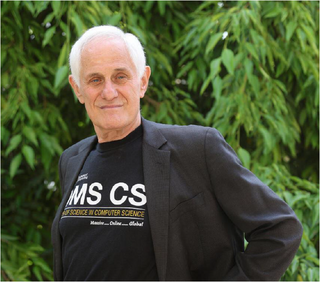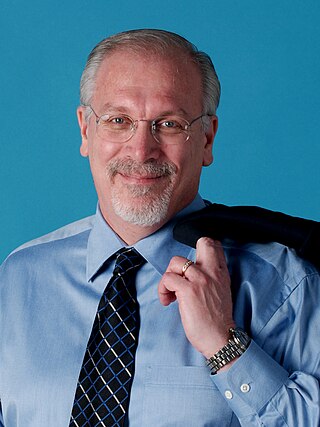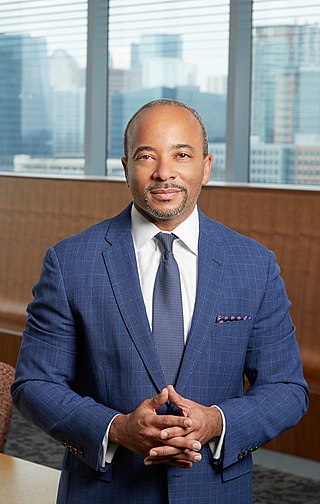
David J. Farber is a professor of computer science, noted for his major contributions to programming languages and computer networking who is currently the distinguished professor and co-director of Cyber Civilization Research Center at Keio University in Japan. He has been called the "grandfather of the Internet".

John Patrick "Pat" Crecine was an American educator and economist who served as President of Georgia Tech, Dean at Carnegie Mellon University, business executive, and professor. After receiving his early education at public schools in Lansing, Michigan, he earned a bachelor's degree in industrial management, and master's and doctoral degrees in industrial administration from the Graduate School of Industrial Administration at Carnegie Mellon University. He also spent a year at the Stanford University School of Business.

David A. Bader is a Distinguished Professor and Director of the Institute for Data Science at the New Jersey Institute of Technology. Previously, he served as the Chair of the Georgia Institute of Technology School of Computational Science & Engineering, where he was also a founding professor, and the executive director of High-Performance Computing at the Georgia Tech College of Computing. In 2007, he was named the first director of the Sony Toshiba IBM Center of Competence for the Cell Processor at Georgia Tech.

The College of Computing is a college of the Georgia Institute of Technology, a public research university in Atlanta, Georgia. It is divided into four schools: the School of Computer Science, the School of Interactive Computing, the School of Computational Science & Engineering, and the School of Cybersecurity and Privacy. The College of Computing's programs are consistently ranked among the top 10 computing programs in the nation. In 2022, U.S. News & World Report ranked the Computer Science graduate program #6 in the U.S. In 2016, Times Higher Education and the Wall Street Journal ranked the College #5 in the world.

Zvi Galil is an Israeli-American computer scientist and mathematician. Galil served as the president of Tel Aviv University from 2007 through 2009. From 2010 to 2019, he was the dean of the Georgia Institute of Technology College of Computing. His research interests include the design and analysis of algorithms, computational complexity and cryptography. He has been credited with coining the terms stringology and sparsification. He has published over 200 scientific papers and is listed as an ISI highly cited researcher.

Richard Allan DeMillo is an American computer scientist, educator and executive. He is Professor and holds the Charlotte B. and Roger C. Warren Chair in Computing at the Georgia Institute of Technology.
Anind Dey is a computer scientist. He is the Dean of the University of Washington Information School. Dey is formerly the director of the Human-Computer Interaction Institute at Carnegie Mellon University. His research interests lie at the intersection of human–computer interaction and ubiquitous computing, focusing on how to make novel technologies more usable and useful. In particular, he builds tools that make it easier to build useful ubiquitous computing applications and supporting end users in controlling their ubiquitous computing systems.

Annie Antón is an academic and researcher in the fields of computer science, mathematical logic, and bioinformatics.
Elizabeth D. "Beth" Mynatt is the Dean of the Khoury College of Computer Sciences at Northeastern University. She is former executive director of the Institute for People and Technology, director of the GVU Center at Georgia Tech, and Regents' and Distinguished Professor in the School of Interactive Computing, all at the Georgia Institute of Technology.

Stephen Edward Cross is the executive vice president for research (EVPR) at the Georgia Institute of Technology (Georgia Tech), a position to which he was appointed in 2010. As EVPR, Cross coordinates research efforts among Georgia Tech's colleges, research units and faculty; and provides central administration for all research, economic development and related support units at Georgia Tech. This includes direct oversight of Georgia Tech's interdisciplinary research institutes, the Georgia Tech Research Institute (GTRI), the Enterprise Innovation Institute (EI2) and the Georgia Tech Research Corporation (GTRC).

Subra Suresh is an Indian-born American engineer, materials scientist, and academic leader. He is currently Professor at Large at Brown University and Vannevar Bush Professor of Engineering Emeritus at the Massachusetts Institute of Technology (MIT). He was Dean of the School of Engineering at MIT from 2007 to 2010 before being appointed as Director of the National Science Foundation (NSF) by Barack Obama, where he served from 2010 to 2013. He was the president of Carnegie Mellon University (CMU) from 2013 to 2017. Between 2018 and 2022, he was the fourth President of Singapore's Nanyang Technological University (NTU), where he was also the inaugural Distinguished University Professor.
Daniel E. Atkins III is the W. K. Kellogg Professor of Community Informatics at University of Michigan.
Robert B. Schnabel is an American computer scientist. He was executive director and CEO of the Association for Computing Machinery (ACM) from November 1, 2015 to 2017. He is now professor and external chair of computer science at University of Colorado Boulder.
Angel G. Jordan was a Spanish-born American electronics and computer engineer known as the founder of the Software Engineering Institute (SEI) and co-founder of the Robotics Institute at Carnegie Mellon University (CMU) and served on its faculty for 55 years, since 2003 as Emeritus. He was instrumental in the formation of the School of Computer Science (SCS) at Carnegie Mellon. He has made contributions to technology transfer and institutional development. He served as Dean of Carnegie Mellon College of Engineering and later as the provost of Carnegie Mellon University.

Farnam Jahanian is an Iranian-American computer scientist, entrepreneur, and academic. He serves as the 10th president of Carnegie Mellon University.

Charles Lee Isbell Jr. is an American computationalist, researcher, and educator. He is Provost and Vice Chancellor for Academic Affairs at the University of Wisconsin–Madison. Before joining the faculty there, he was a professor at the Georgia Institute of Technology College of Computing starting in 2002, and served as John P. Imlay, Jr. Dean of the College from July 2019 to July 2023. His research interests focus on machine learning and artificial intelligence, particularly interactive and human-centered AI. He has published over 100 scientific papers. In addition to his research work, Isbell has been an advocate for increasing access to and diversity in higher education.

Reginald DesRoches is an American civil engineer who, as of July 1, 2022, serves as the president at Rice University. From 2020 until 2022, he served as provost of Rice. Earlier, beginning in 2017, he was the dean of engineering at Rice's school of engineering, and from 2012 to 2017, DesRoches held the Karen and John Huff Chair at the Georgia Institute of Technology.

Raheem Beyah is an American computer engineer, researcher, and educator. As of January 15, 2021 he is the Dean of the College of Engineering and Southern Company Chair at the Georgia Institute of Technology. Prior to becoming the Dean, he was the vice president for Interdisciplinary Research and the Motorola Foundation Professor and the executive director of Georgia Tech's online masters in cyber security program. Beyah is also the co-founder and chair of industrial security company Fortiphyd Logic, Inc.
Kaye Husbands Fealing is an American economist who is Dean of the Ivan Allen College of Liberal Arts at Georgia Tech. She previously taught for 20 years at Williams College, served in several staff positions with the National Science Foundation, and chaired the School of Public Policy at Georgia Tech. She is a former president of the National Economic Association.
Nicolaos Georgiou Alexopoulos is a Greek electrical engineer, former professor and university dean, and a champion of education and research. He currently serves as the Vice President for Academic Programs and University Relations at the Broadcom Foundation, and previously was Vice President for Antennas, RF Technologies, and University Relations at Broadcom Corporation from 2008 to 2015. In 2005, he received an honorary doctorate degree from the National Technical University of Athens "for contributions to education and research in engineering electrodynamics and for his public lectures on the 'Genesis and Destruction of the First Research University: The Museum/Library of Alexandria."













